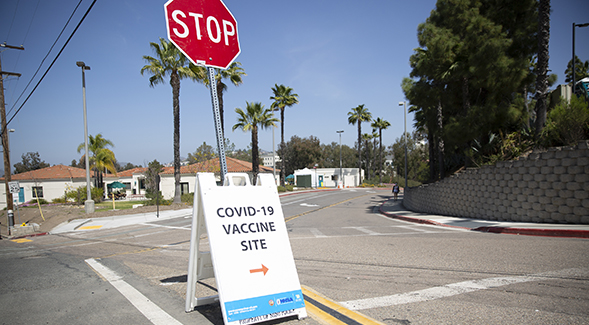Researchers Find Access Hurdles to COVID-19 Vaccinations
An SDSU team focused on heavily Latinx communities of South San Diego County contributed to a major national report on equity in vaccination rollouts.

For those looking to halt the spread of COVID-19 at a community level, the first rule may be this:
“You can’t just talk about COVID,” said Elisa Sobo, chair and professor of anthropology at San Diego State University.
Sobo and Noe Crespo of the School of Public Health were co-principal investigators on the SDSU team that contributed to a national coalition’s report, “Carrying Equity in COVID-19 Vaccination Forward: Guidance Informed by Communities of Color.” Released today, it outlines strategies to ensure a more equitable, community-based rollout of life-saving vaccines.
In San Diego County’s most heavily Hispanic and Latino communities, the SDSU team found there are any number of interconnected issues beyond one’s trust in the vaccines that can play into one’s willingness and ability to get the vaccine. They range from worries over having enough to eat to anxiety over who’ll look after the kids if their caregiver is knocked out for a day by vaccine side effects.
For this population, Sobo said, COVID-19 is “one little tiny thing … the tip of the iceberg” in a life that is tough already.
It’s not always facts people need to be convinced to get a vaccine, the national coalition found after comparing results from six different regions. Mostly it’s access, which the coalition said can be there on paper but unattainable in reality due to the array of daily barriers and previous bad experiences with the health care system.
The SDSU team included researchers from the College of Arts and Letters and focused on South San Diego County. It is one of six university-based groups across the country participating in the national CommuniVax Coalition, led by Johns Hopkins Center for Health Security and Texas State University.
The project was designed in part to find ways to reduce the disproportionate, devastating impact of the pandemic on historically underserved Black and Latinx communities.
“There is no one size fits all solution,” the coalition said today in releasing its report. “We must empower and equip local communities to have a guiding hand in their own public health interventions.”
Project manager Griselda Cervantes said the researchers conducted interviews and focus groups, sent mass emails and connected with community leaders to find their perceptions “of what is needed in their community in order to recover from this pandemic” and to promote overall wellness for the future.
While mass vaccination sites such as the one at Downtown San Diego’s Petco Park provided a solution for many, Cervantes said the team found many useful much smaller community level efforts that “started out just wanting to help neighbors, then grew because they realized that there was a need.”
The SDSU team’s fieldwork is still underway, she said, working to identify additional unvaccinated individuals.
Crespo, associate professor of health promotion and behavioral science and co-lead of the SDSU project team, said San Diego’s border location presented issues rarely seen in other research sites for the study, which included agricultural regions of Idaho and in Maryland, the mostly Black Prince George’s County.
For those in families that regularly cross the border (both northbound and southbound), COVID-19 is a “binational experience where availability and eligibility look differently,” he noted. For example, there are currently more vaccine varieties available in Mexico, and the eligibility criteria are different.
And for some, Crespo said: “The main issue is trying to avoid any contact with formal institutions so that it doesn’t come back to negatively impact you later.” Some immigrants worry that taking a vaccine could make them a 'public charge or public burden,' potentially making them ineligible for permanent admission after receiving a certain level of public benefits.
The legal rule doesn’t apply to health care and COVID-19 vaccination, Sobo noted. But some don’t want to take a chance, thinking “I have to stay under the radar to keep my docket clean.”
“People in the south region mostly want vaccination but there are other kinds of barriers,” Sobo added. “You’re supposed to be able to get time off work. But that’s hard to do if you need the money or you know that if you do go your boss is going to give you the stink eye, and you’re going to get stigmatized, and then you’re going to get the worst assignment.
“We might call them little things but they mount up to big, big barriers,” Sobo said.
In addition to Sobo, Crespo and Cervantes, the SDSU CommuniVax team included Corinne McDaniels-Davidson, director of the Institute for Public Health at SDSU; Susan Kiene, professor of global health; and two graduate student research assistants, Diego Ceballos in the School of Public Health and Latin American Studies, and Sarah Song in the Department of Child and Family Development.
The SDSU team found promotoras (community health workers), who are trained to provide basic health education in Latinx communities, play an essential role in helping community members overcome barriers to vaccination and other health care access.
Cervantes said community-based organizations don’t always know of all the funding sources they can tap into to support their needs, and the SDSU team is working with these groups’ leaders to provide funding guidance
That’s part of a possible long-term spinoff from the project. While the CommuniVax coalition that included SDSU was formed late last year amid the height of COVID-19’s devastating impact across the world, it has a purpose beyond academic publications, Sobo said.
“The larger holistic project is aiming to really make some durable change that sticks in the health infrastructure,” she said, “so that we don’t get into this kind of a problem to begin with next time that there’s a rampant virus making its way around.”



